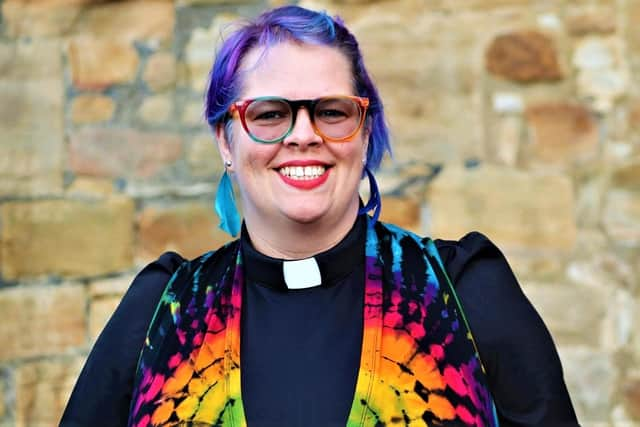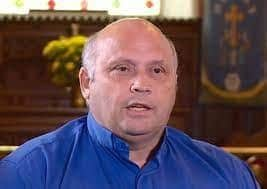Proposal to call God 'non-binary' or female: Northern Irish canon questions if Anglican church is choosing 'sinking sand over solid ground'
and live on Freeview channel 276
Rev Alan Irwin made the comments following the Church of England's general synod, during which it was revealed that the church is considering non-male terminology to refer to God.
Canon Irwin said that altering church doctrine in response to modern mores "is to deviate from God's Word of truth".
Advertisement
Hide AdAdvertisement
Hide Ad••• ‘LITERALLY AIDING MARGINALISED COMMUNITIES’ •••


The synod (effectively the governing body of the church) met mid-week, and much of the media coverage focussed on its approval of the idea that clergy can bless gay couples' marriages.
That same motion also said members "lament and repent... the harm that LGBTQI+ people have experienced and continue to experience in the life of the church" (LGBTQI+ stands for lesbian, gay, bisexual, transgender, queer/questioning, intersex, and more).
But at the same time it also emerged that the Church of England is considering alternatives to referring to God as “He”.
A project is to be launched in the spring to decide whether to propose such changes (though exact details are unclear).
Advertisement
Hide AdAdvertisement
Hide Ad

This came to light as a minister, Chantal Noppen from Sunderland, used an address to the synod to describe the Holy Spirit as "She".
Rev Noppen went on to tell the press afterwards that changing way we refer to God would mean "literally giving voice to more marginalised communities".
"Biblically, the Godhead is referred to throughout scripture with a large number of pronouns and descriptors. Not all male," Rev Noppen said.
"It is about time the liturgy of the Church of England recognised and affirmed this."
Advertisement
Hide AdAdvertisement
Hide Ad

••• ‘GOD IS NOT A WHITE NON-TRANSGENDER MALE’ •••
Rev Noppen, in an interview with the Press Association news agency, went on to say following her address at the synod: “Patriarchal society and assumptions have long damaged and reduced the possibility and potential of people, particularly those who do not conform or fit that model – women, non-heteronormative folk.
“Such ideas and language, if we’re honest, have been used to control, justify and condone abuse.
“Surely we should be responding to that reality and distancing ourselves from that?
“God is not male.
“Certainly not the white cis male with a beard, sitting on a cloud, we seem to reduce and limit God to so often.
Advertisement
Hide AdAdvertisement
Hide Ad“Using exclusively male terminology when referring to God suggests an unhelpful and unhealthy limited understanding of God."
[‘Cis’ is a term used by transgender advocates to refer to anyone who is not transgender or ‘non-binary’].
Her comments come just a few weeks after a minister with the name Bingo Allison – a married father-of-three with autism who ministers in Liverpool – hit the headlines by giving interviews to the media about being not a man but a “gender-queer” person who uses the pronouns they/them instead of he/him.
••• ‘ALL SCRIPTURE IS GIVEN INSPIRATION BY GOD’ •••
Canon Irwin (who is based in Clogher, and also often speaks on Troubles victims' issues) told the News Letter: "Theologians have debated the nature of God for centuries.
Advertisement
Hide AdAdvertisement
Hide Ad"What has changed in 2023 that we believe we have the answer? Are we God? Do we believe we have the mind of God?
"Our 'He'-based system of God is based on Jesus. Jesus is God’s Son. Jesus is God."
He stressed his belief in God as "Father, Son, and Holy Spirit" and highlighted 2 Timothy Chapter 3.16 (KJV): "All scripture is given by inspiration of God, and is profitable for doctrine, for reproof, for correction, for instruction in righteousness".
Canon Irwin added: "To somehow change scripture, its doctrines, to make it more socially acceptable, is to deviate from God’s Word of truth."
Advertisement
Hide AdAdvertisement
Hide AdAs for what such things mean for the majority-conservative worldwide Anglican family, he said: "It will, I feel, cause concern for many. They will no doubt question the foundations on which the communion as a whole is building: on the solid rock or, on sinking sand?
"And what implications might that have for the wider universal church of Christianity?"
••• GOD AS A MOTHER •••
Retired churchman John Mann takes a different tack.
Originally ordained in the Church of England, the Very Revd Mann went on to become dean of Belfast 2011-17, and chairman of Church of Ireland synod’s committee on ‘Matters of Human Sexuality in the context of Christian Belief’ from 2013-2017.
Today he lives on the Isle of Mann.
"I believe that what has been happening in the Church for sometime is a desire amongst many churchgoers to try and see beyond the gender stereotypical language about God.
Advertisement
Hide AdAdvertisement
Hide Ad"So for example instead of saying ‘in the Name of the Father, Son and Holy Spirit’ you will hear preachers pray before their sermon: ‘in the name of God: Creator, Redeemer and Sanctifier’.
"One might say that it has come about by trying to reflect our understanding of the totality of sexuality bound up in the nature of God – in so far as we can project such, and express it within the limitation of the language we have to use.
“To try and hold a sense of the feminine in the Godhead is not modern either. In the 14th century, Julian of Norwich could speak of ‘God chose to be our mother in all things…’ and ‘Jesus is our true mother, the protector of the love which knows no end…’ (see, Celebrating Common Prayer, Mowbray 1992 p. 234/5).
“Or St Anslem of Canterbury in the 11th century who can write: “Jesus, as a mother you gather your people to you…” (Ibid p. 232).
Advertisement
Hide AdAdvertisement
Hide Ad"The problem that the Church has in speaking of God in entirely gender neutral language is, of course, bound up with the habitual usage of twenty centuries, in addition to the fact that Jesus was a man and he instructed his followers to refer to God as ‘Father’.
"Therein lies the dilemma.
"I don’t believe that individual worshippers are trying to make a point, but wish to be both sensitive to the feelings of others and true to, and comfortable with, their own habitual prayers, that are in many cases the practice of a lifetime.”
As to the general director of the church on LBGTQQIA+ matters, he said: “The Church of England and the Church of Ireland, have historically made changes of note, such as the ordination of women and the re-marriage of divorcees, incrementally.
"This is a long-established path that can be criticised by all sides as, on the one hand, not making changes quickly enough to keep pace with the views of society in general, and on the other by introducing the thin end of a wedge,to start a change in attitude in the Church in order to make the change more acceptable a few years down the line.
"Herein lies the problem for the Church.
Advertisement
Hide AdAdvertisement
Hide Ad"But meanwhile individuals feel, not without good reason, that they are being treated as part of an, ‘issue’ for the Church, rather than as loving, devoted and committed people, seeking their place in the family of God.”
••• FATHER, SON, HOLY GHOST •••
Asked what the Church of Ireland's position is on the practice of referring to God as male, and if this something that could potentially be open to challenge, church headquarters replied:
“The Church of Ireland is a synodical Church and matters such as these are considered by its members at our General Synod.
"No such item has appeared on the General Synod agenda but if it were to do so, it would be discussed by its members.”
Advertisement
Hide AdAdvertisement
Hide AdIt pointed to the church constitution’s Preamble and Declaration, which begin with the words: “In the Name of the Father, and of the Son, and of the Holy Ghost...”
Asked if even this could be subject to change by synod, the reply came: “Every denomination has one or several foundational documents which express a core Christian theology and its own distinctive doctrines.
"The Preamble and Declaration is a statement of Christian faith and doctrine, as is also the case with similar statements. It is therefore unchanged since its approval over 150 years ago.”